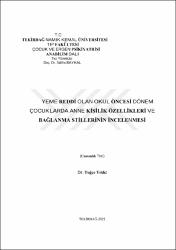| dc.contributor.advisor | Baykal, Saliha | |
| dc.contributor.author | Yıldız, Tuğçe | |
| dc.date.accessioned | 2022-04-06T06:49:39Z | |
| dc.date.available | 2022-04-06T06:49:39Z | |
| dc.date.issued | 2021 | |
| dc.identifier.uri | https://tez.yok.gov.tr/UlusalTezMerkezi/TezGoster?key=RjZwH00oMG4iNa5Sgvlggwaf7UK5AujVyKgf-DoALail49d-wSL4Xo9xX2UIDG3M | |
| dc.identifier.uri | https://hdl.handle.net/20.500.11776/4220 | |
| dc.description.abstract | Yeme reddi bebek ve küçük çocuklarda oldukça sık görülmekte olup fiziksel ve zihinsel gelişme geriliği, çeşitli davranış sorunları ve ebeveyn çocuk ilişkisinde oluşturduğu problemler açısından önem taşımaktadır. Yeme reddi etiyolojisinde biyolojik ve psikososyal fakörlerin birbirleriyle etkileşiminin sorumlu olduğu düşünülmektedir. Çalışmamızda, yeme reddi olan okul öncesi dönem çocuklarda anne kişilik özellikleri ve bağlanma stillerinin sağlıklı kontrol grubu ile karşılaştırılması ve elde ettiğimiz sonuçların ileride tedavi planlamasına yol gösterebilmesi amaçlanmıştır. Çalışmamız hasta grubunda yeme reddi şikayeti ile Çocuk Sağlığı ve Hastalıkları ya da Çocuk ve Ergen Psikiyatrisi polikliniğine başvuran, 2-6 yaş arası 60 hasta ve annesi, kontrol grubunda ise yeme reddi şikayeti olmayan, sağlıklı 34 gönüllü katılımcı ve annesi olmak üzere iki grup şeklinde dizayn edilmiştir. Kullanılan ölçüm araçları; Mizaç Karakter Envanteri, Erişkin Bağlanma Ölçeği, Bilgilendirilmiş Gönüllü Olur Formu ve Sosyodemografik Veri Formu'ndan oluşmaktadır. Grupların mizaç ve karakter özellikleri karşılaştırıldığında yeme reddi olan çocukların annelerinde zarardan kaçınma mizaç boyutunun çabuk yorulma alt ölçek puanı kontrol grubuna göre anlamlı şekilde düşük, yeme reddi olan çocukların annelerinde kendini yönetme karakter boyutunun sorumluluk alma alt ölçek puanı kontrol grubuna göre anlamlı şekilde yüksek bulunmuştur. Hasta grubunun alt grupları kendi içerisinde karşılaştırıldığında seçici yeme grubundaki çocukların annelerinin işbirliği yapma karakter boyutunun yardımseverlik alt ölçek puanları diğer hasta alt gruplarındaki annelere göre anlamlı şekilde yüksek saptanmıştır. Grupların anne bağlanma stilleri açısından benzer olduğu görülmüştür. Hasta grubunda Kaçıngan / Kısıtlı Yiyecek Alımı Bozukluğu görünümleri dağılımı; seçici yeme, iştahsızlık, yemekten korkma-kaçınma şeklinde sıralanmıştır. | en_US |
| dc.description.abstract | Food refusal is prevalent in infants and early children, and it has consequences in terms of physical and mental developmental delay, behavioural and parent-child relationships problems. The etiology of food refusal is assumed to be the result of biological and psychosocial factors' interactions. The aim of our study was to compare the maternal personality traits and attachment styles of preschool children with food refusals and healthy control group, and to guide treatment planning in the future. Our study included 60 patients aged 2 to 6 years old and their mothers who applied to the Child Health and Diseases or Child and Adolescent Psychiatry outpatient clinic with a complaint of food refusal, and also 34 healthy volunteers and their mothers. Forms and scales used in this study consisted of Temperament Character Inventory, Adult Attachment Scale, Informed Consent Form and Sociodemographic Form. When the temperament and character traits of the groups were compared, the fatigability subscale score of the harm avoidance temperament dimension in mothers of children with food refusal was significantly lower than the control group, while the taking responsibility subscale score of the self-directed character dimension in mothers of children with food refusal was significantly higher than the control group. The helpfulness subscale scores of the cooperativeness character component of the mothers of children in the selective eating group were substantially higher than the mothers of children in the other patient categories when the patient subgroups were compared within themselves. In terms of maternal attachment styles, both groups were found to be similar. Distribution of Avoidant/Restrictive Food Intake Disorder appearances in the patient group were; selective eating, poor appetite, fear-avoidance of food. | en_US |
| dc.language.iso | tur | en_US |
| dc.publisher | Tekirdağ Namık Kemal Üniversitesi | en_US |
| dc.rights | info:eu-repo/semantics/openAccess | en_US |
| dc.subject | Psikiyatri | en_US |
| dc.subject | Psychiatry | en_US |
| dc.subject | Çocuk Sağlığı ve Hastalıkları | en_US |
| dc.subject | Child Health and Diseases | en_US |
| dc.title | Yeme reddi olan okul öncesi dönem çocuklarda anne kişilik özellikleri ve bağlanma stillerinin incelenmesi | en_US |
| dc.title.alternative | Investigation of the personality traits and attachment styles of the mothers of preschool children with food refusal | en_US |
| dc.type | specialistThesis | en_US |
| dc.department | Enstitüler, Tıp Fakültesi, Çocuk ve Ergen Psikiyatrisi Ana Bilim Dalı | en_US |
| dc.identifier.startpage | 1 | en_US |
| dc.identifier.endpage | 103 | en_US |
| dc.institutionauthor | Yıldız, Tuğçe | |
| dc.relation.publicationcategory | Tez | en_US |
| dc.identifier.yoktezid | 702598 | en_US |



















